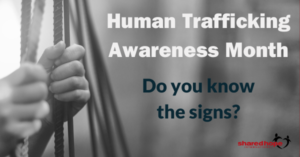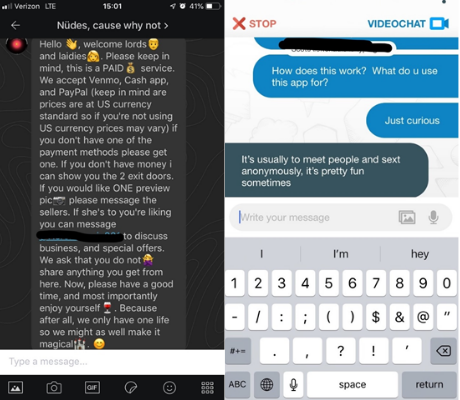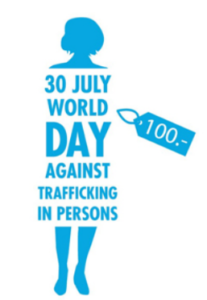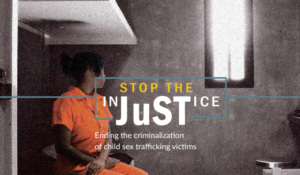
January is Human Trafficking Awareness Month. Do you know the warning signs?
As you read this, millions of women, men and children around the world are subject to being trafficked. To address this evil injustice, it helps to define and know exactly what it is.
The federal Trafficking Victims Protection Act defines human trafficking as:
- The recruitment, harboring, transportation, provision, or obtaining of a person for the purpose of a commercial sex act where such an act is induced by force, fraud, or coercion, or in which the person induced to perform such act has not attained 18 years of age, or
- The recruitment, harboring, transportation, provision, or obtaining of a person for labor or services, through the use of force, fraud, or coercion for the purpose of subjection to involuntary servitude, peonage, debt bondage, or slavery.”
Human trafficking can take many forms, such as domestic servitude; factory labor that resembles prisons; farm work by migrants. War has created a new market for traffickers to exploit refugees fleeing a war that has torn apart their communities or countries – in many cases these migrants pay a fee to board a ship and are at the whim of their smugglers.
Human trafficking is a problem everywhere, including the United States. Including your neighborhood.
Domestic Minor Sex Trafficking (DMST) occurs when a U.S. citizen or lawful permanent resident minors (under the age of 18) are commercially sexually exploited. Children can be commercially sexually exploited through prostitution, pornography, and/or erotic entertainment.
We’re talking about U.S. kids, under the age of 18, being bought and sold for sex.
The age of the victim is the critical issue — under federal law, there is no requirement to prove that force, fraud, or coercion was used to cause the minor to engage in commercial sex.
The law recognizes the effect of psychological manipulation by the trafficker, as well as the effect of threat of harm which traffickers/pimps use to maintain control over their young victims.
But cultural bias continues to influence access to justice and services for minor victims. Even when protective laws are on the books.
Under the leadership of the Shared Hope Institute for Justice and Advocacy, we are working hard to address the issue of human trafficking in combating one of the most vehement forms: domestic minor sex trafficking. And there is no time like today to JOIN US in our efforts to end this terrible evil once and for all.
Advocate: See laws change in your state. January is the beginning of legislative sessions all over the country; now is the time to contact your legislators and have your voice heard through our Advocacy Action Center. We make it easy and quick for you with pre-written emails and tweets.
Volunteer: Receive comprehensive training and empowered to join a team of volunteers raising awareness and providing prevention education in all communities across the nation. Connect with other volunteer Ambassadors of Hope and work together to help make all communities safer for children.
Give: Empower Shared Hope’s work to prevent the conditions that foster sex trafficking, restore and empower survivors, and bring justice to victims with a gift.
Help us make freedom a priority this Human Trafficking Awareness Month.
We can win this battle.



 By Marissa Gunther, Director of Growth Strategies, Shared Hope International
By Marissa Gunther, Director of Growth Strategies, Shared Hope International
 He quickly realizes that he can’t save all of the children alone. He needs more help.
He quickly realizes that he can’t save all of the children alone. He needs more help.
 And so, we support the United Nation’s
And so, we support the United Nation’s 
 Astonishingly,
Astonishingly, 






